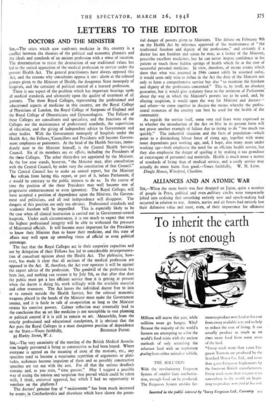LETTERS TO THE EDITOR
DOCTORS AND THE MINISTER
Sta,—The crisis which now confronts medicine in this country is a conflict between the theories of the political and economic planners and the ideals and standards of an ancient profession with a sense of vocation.
The determination to resist the destruction of our traditional values has led to the united opposition of the medical profession to service under the present Health Act. The general practitioners have always opposed this Act, and the reasons why consultants oppose it are: alarm at the colossal powers given to the Minister of Health, the dangerous State monopoly of hospitals, and the certainty of political control of a learned profession.
There is one aspect of the problem which has important bearings upcfn all medical standards and ultimately upon the quality of treatment of all
patients. The three Royal Colleges, representing the professional and educational aspects of medicine in this country, are the Royal College of Physicians of London, the Royal College of Surgeons of England and the Royal College of Obstetricians and Gynaecologists. The Fellows of these Colleges are consultants and specialists, and the functions of the Colleges are the maintenance of professional standards, the supervision of education, and the giving of independent advice to Government and other bodies. With the Government monopoly of hospitals under the Health Act, the Fellows,"Councillors and Presidents will become Govern- ment employees or pensioners. At the head of the Health Services, imme- diately next to the Minister himself, is the Central Health Services Council. Six of its members are ex officio, including the Presidents of the three Colleges. The other thirty-five are appointed by the Minister. As the law now stands, however, "the Minister may, after consultation with the Central Council, by order vary the constitution of that Council." The Central Council has to make an annual report, but the Minister
kay refrain from laying this report, or part of it, before Parliament, if at would be contrary to the public interest to do so. In the course of time the position of the three Presidents may well become one of progressive embarrassment or even ignominy. The Royal Colleges will have accepted a position of dependence upon the Minister, the Govern- ment and politicians, and all real independence will disappear. The dangers of this position are only too obvious. Professional standards and academic freedom will be imperilled. This is especially likely to be the case when all clinical instruction is carried out in Government-owned hospitals. Under such circumstances, it is too much to expect that even the highest professional integrity will be able to withstand the pressure of Ministerial officials. It will become more important for the Presidents to know their Minister than to know their medicine, and this state of affairs may well open up unending vistas of official or even political patronage.
The fact that the Royal Colleges act in their corporate capacities and not by delegation of their Fellows has led to considerable misrepresenta- tion of consultant opinion about the Health Act. The plebiscite, how- ever, has made it clear that all sections of the medical profession are opposed to the Act. If, therefore, the Act ever operates it will be against the expert advice of the profession. The goodwill of the profession has been lost, and nothing can restore it by July 5th, so that after that date the public must get a less efficient service than it is getting at present when the doctor is doing his work willingly with the available material and other resources. The Act leaves the individual doctor free to join or to remain outside the Health Service, but the colossal economic weapons placed in the hands of the Minister must make the Government uneasy, and it is futile to talk of co-operation as long as the Minister retains his coercive powers. Calmer reflection may eventually lead to the conclusion that an art like medicine is not susceptible to vast planning or political control if it is still to remain an art. -Meanwhile, from the strictly professional and educational standpoints, it is obvious that the Act puts the Royal Colleges in a most dangerous position of dependence


































 Previous page
Previous page